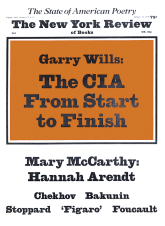In response to:
Disturbing, Fanatical, and Heroic from the November 13, 1975 issue
To the Editors:
I should like to correct one mistake which has crept into the excellent review which my friend Leonard Schapiro has written of Solzhenitsyn’s Gulag Two [NYR, November 13]. In speaking of the collection of essays entitled “Iz glubiny” (De Profundis), which was conceived and edited by my father, Peter Struve, he says that it was published in Moscow in 1918 “and immediately suppressed.”
This was not quite the case, and its story is actually more interesting. The volume was, indeed, ready for publication in the summer of 1918. I remember very well how my father was collecting material for it, while living more or less in hiding in Moscow, apart from his family. He did so partly through correspondence and partly through personal meetings with such friends of his as Nikolay Berdyaev, Fr. Sergius Bulgakov, Vyacheslav Ivanov, and others, all of whom lived in Moscow. In August 1918, however, my father left Moscow with the intention of emigrating. For the rest of that year both he and I travelled and lived, at first separately and then together, under false names and with false passports, in the North of Russia. Our original plan of crossing the front line after the Allied landings in Murmansk and Arkhangelsk did not materialize, because, contrary to our hope and expectation, the Allies did not advance further south. We ended by going, in December 1918, to Petrograd and then, accompanied by three friends, crossing the Russian-Finnish frontier on foot on two different days, in order to avoid being caught together if such a thing happened. In the meantime, before leaving Moscow, my father had entrusted his two friends who were helping him to prepare the volume for publication, Professor Simon Frank in Saratov and Alexander Izgoev in Petrograd, with seeing the volume through the press.
However, as a result of the wave of repressions which followed the attempt on Lenin’s life, Frank and Izgoev (perhaps after consultation with some of the other contributors) decided to withhold the publication. Thus, the volume was not published in 1918. It was brought out only in the spring of 1921, at the time of the Kronstadt rising, by the workers of the Kushnerev printing office in Moscow. They did it entirely on their own, without consulting anyone. The volume was, of course, immediately confiscated, but a certain number of copies got distributed somehow. The book became a great bibliographical rarity. In 1922, when a number of prominent intellectuals—writers, philosophers, journalists—were expelled from Soviet Russia on Trotsky’s orders, Nikolay Berdyaev brought his own copy of “Iz glubiny” to Berlin. It is now preserved, I believe, in his library in France.
Curiously enough, in 1934, the Soviet book agency “Mezhdunarodnaya kniga” included “Iz, glubiny” in the catalog of its books destined for export. One copy of it was bought by a Dutch scholar, a friend of Professor Frank, and he presented it to the latter. I now possess two Xerox copies of that volume which I had made for me when, in 1960, I tried to arrange its reissue with the University of Michigan Press. I did not succeed in that, but the volume was reissued by YMCA-Press in Paris in 1967. The story of its original publication, based on what Professor Frank had told in his book about my father (New York, Chekhov Publishing House, 1956), is recounted, with some minor inaccuracies, in the introduction to that Paris edition.
Gleb Struve
Dept. of Slavic Languages and Literature
University of California at Berkeley
This Issue
January 22, 1976



